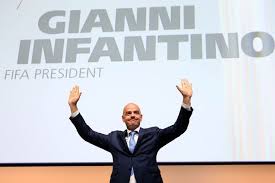By Andrew Warshaw and Paul Nicholson in Mexico City
May 13 – Just when he promised the world he would be leading FIFA into a new era of transparency and good governance, Gianni Infantino faces new accusations of undermining the corruption-plagued organisation’s entire reform process after less than three months as president.
In an otherwise trumpet-blowing first Congress as the most powerful man in world football since taking over from Sepp Blatter, Infantino’s presidency was plunged into controversy when FIFA’s new-look council, which was supposed to lack the power and authority of the former executive committee, was handed the right within the next 12 months to sack members of the very bodies who have striven so diligently to clean things up by getting rid of a raft of rogues.
Those in the firing line could technically include ethics judge Hans-Joachim Eckert, investigative chief Cornel Borbely and, most notably, audit and compliance chairman Domenico Scala – FIFA’s integrity guru who drew up the original draft of reforms.
Incredibly Infantino risks jeopardising the very process he says he is so keen to promote as, with little fanfare and no objection from the floor of the Congress, a highly contentious agenda item was passed by delegates who seemed unaware of the potential implications.
The proposal read as follows: The Council proposes that the Congress authorise the Council to appoint the office holders for the remaining vacant positions within the respective committees of the judicial bodies, the audit and compliance committee and of the governance committee, until the 67th FIFA congress and to dismiss any office holders of these committees until the 67th FIFA Congress which shall come into effect immediately.
Insideworldfootball understands that the proposal was added to the agenda at the 11th hour and had not been seen by member associations prior to its display on the big screen in the auditorium, but was deliberately directed at Scala, who walked out of the Congress hall shortly after delivering his own report on the work of the audit and compliance committee.
Sources close to the 37-strong Council, yet to be finalised and which at this stage comprises exactly the same membership as the executive committee it is supposed to replace, said Infantino and Scala had fallen out on a number of issues, one of which was Infantino’s seemingly unilateral choice of Fatma Samba Diouf Samoura as his new number two without going through a multi-candidate comprehensive selection process.
At an 8am Council meeting this morning – which was really still the old FIFA executive committee as new members have still to take their places on the new body – Infantino introduced his choice of Samoura for the first time and asked the Council to approve his recommendation.
Insideworldfootball understands that neither Scala nor Council members had any prior knowledge of the fact that Infantino had chosen FIFA’s new General Secretary instead of agreeing to a democratic headhunting process encouraged by the new reform measures.
Asked why the appointment was made in this way, Infantino responded at a press conference after the Congress saying: “I simply wanted to announce it to the council and then the members (national associations) and then the press. Council heard it first and accepted and supported my proposals… I said all along I didn’t want a European General Secretary… She is the right woman for this job, for this place.”
The decision again raises questions over how democratic a FIFA under Infantino will be in reality. Infantino had the right and a mandate to find a general secretary, and the Council has to approve that person. But the reform process points towards a considerably more rigorous process of selection and approval than has been described today.
What has in effect happened is that the new FIFA Council – that has yet to meet with all its elected members – has already approved the position of arguably the most important position in the organisation in terms of building its financial and operational future. Rather than having the opportunity to choose that person they will meet for the first time having had that person chosen for them.
One rumour circulating the floor of the Congress was that Infantino’s contentious proposal was sparked by the fact that he had rejected a salary offer from Scala’s compensation committee that was less than Blatter had earned – the sum believed to have been offered to him, by Scala, was $2 million.
Asked in the press conference what his salary would be as President – one of the new reforms is that executive salary will be disclosed – he said that this hadn’t been finalised and that it would be released when the accounts are published
Challenged on whether giving the Council authority to hire and fire independent personnel was undermining the work of FIFA’s corruption watchdogs, he urged critics to wait and see how the new rule works in practice.
“We are following a democratic process,” he said. “We are trying to appoint the right persons with high credibility and truly independent. The only change approved today is to give the flexibility, only for 12 months, to dismiss and appoint members if the Council feels that is needed. Judge the quality of the members sitting on these boards rather by putting intentions in the minds of people that are far from reality.”
Contact the writers of this story at moc.l1744454501labto1744454501ofdlr1744454501owedi1744454501sni@w1744454501ahsra1744454501w.wer1744454501dna1744454501 or moc.l1744454501labto1744454501ofdlr1744454501owedi1744454501sni@n1744454501osloh1744454501cin.l1744454501uap1744454501

